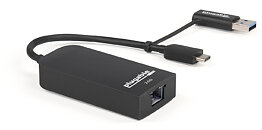- Joined
- Oct 9, 2007
- Messages
- 47,294 (7.53/day)
- Location
- Hyderabad, India
| System Name | RBMK-1000 |
|---|---|
| Processor | AMD Ryzen 7 5700G |
| Motherboard | ASUS ROG Strix B450-E Gaming |
| Cooling | DeepCool Gammax L240 V2 |
| Memory | 2x 8GB G.Skill Sniper X |
| Video Card(s) | Palit GeForce RTX 2080 SUPER GameRock |
| Storage | Western Digital Black NVMe 512GB |
| Display(s) | BenQ 1440p 60 Hz 27-inch |
| Case | Corsair Carbide 100R |
| Audio Device(s) | ASUS SupremeFX S1220A |
| Power Supply | Cooler Master MWE Gold 650W |
| Mouse | ASUS ROG Strix Impact |
| Keyboard | Gamdias Hermes E2 |
| Software | Windows 11 Pro |
Today Plugable is launching its first next-generation 2.5 Gigabit networking device, the Plugable 2.5 Gbps USB Ethernet Adapter (USBC-E2500). With USB-C and USB 3.0 (USB-A) connectivity included, you can quickly and affordably upgrade nearly any modern workstation or laptop with more than double the performance of a traditional Gigabit Ethernet connection.
While most Ethernet adapters only support 1 Gigabit link rates, this USB adapter supports wired speeds up to 2.5 times faster than the 1 Gbps standard when used with Cat 5e cabling (commonly found in existing network environments), and a 2.5 Gbps-capable router or switch. With 2.5 Gbps routers still somewhat rare in home environments, users who would benefit from the increased network throughput—but don't wish to yet invest in a 2.5 Gbps router or switch—can use 2 of these adapters to create a direct peer-to-peer network between 2 systems. With this increased performance, users can take advantage of advances in high-speed networking and storage technologies, without requiring a difficult or expensive setup.


We are only in the early stages of the shift to 2.5 Gbps network equipment arriving in our homes and workplaces, but you're likely to see much wider adoption of 2.5 Gbps network equipment supporting the 2.5GBASE-T / 802.3bz standard in the year ahead. Our 2.5 Gbps USB Ethernet adapter allows you to future-proof your setup while also being backwards compatible with current 1 Gbps network environments. This adapter is ideal for early adopters—and IT professionals—to modernize their network environment with higher network throughput, without needing to run new cables. It also benefits users such as content creators whose work may be bottlenecked by 1 Gbps network transfer rates.
Our USBC-E2500 2.5 Gbps USB network adapter can connect to a system with USB-C ports, and also includes an attached USB-C to USB 3.0 (USB-A) adapter, allowing you to easily use it with any type of USB port you may have (USB 3.0 required for full performance). The adapter is backwards compatible with earlier networking standards such as Gigabit (10/100/1000) networks, and supports key features such as jumbo frames, auto-negotiation, and is compatible with both full-duplex and half-duplex networks, making it an ideal choice for current and future network connectivity.
The 2.5 Gbps USB network adapter works with all modern versions of Windows (10, 8.x, and 7), macOS (10.12 and above), and Linux (kernel 3.2 and above). Please be aware a driver download and installation (using an existing network interface, or with a USB flash drive) may be required on some OS and kernel versions.
The Plugable 2.5 Gigabit USB Ethernet Adapter is available in the US on Amazon.com (with a limited time $10 off coupon), NewEgg, Walmart, and globally on Amazon Canada, UK, EU, Australia, and Japan. For business buyers, it's also available through distribution via Ingram Micro.
View at TechPowerUp Main Site
While most Ethernet adapters only support 1 Gigabit link rates, this USB adapter supports wired speeds up to 2.5 times faster than the 1 Gbps standard when used with Cat 5e cabling (commonly found in existing network environments), and a 2.5 Gbps-capable router or switch. With 2.5 Gbps routers still somewhat rare in home environments, users who would benefit from the increased network throughput—but don't wish to yet invest in a 2.5 Gbps router or switch—can use 2 of these adapters to create a direct peer-to-peer network between 2 systems. With this increased performance, users can take advantage of advances in high-speed networking and storage technologies, without requiring a difficult or expensive setup.


We are only in the early stages of the shift to 2.5 Gbps network equipment arriving in our homes and workplaces, but you're likely to see much wider adoption of 2.5 Gbps network equipment supporting the 2.5GBASE-T / 802.3bz standard in the year ahead. Our 2.5 Gbps USB Ethernet adapter allows you to future-proof your setup while also being backwards compatible with current 1 Gbps network environments. This adapter is ideal for early adopters—and IT professionals—to modernize their network environment with higher network throughput, without needing to run new cables. It also benefits users such as content creators whose work may be bottlenecked by 1 Gbps network transfer rates.
Our USBC-E2500 2.5 Gbps USB network adapter can connect to a system with USB-C ports, and also includes an attached USB-C to USB 3.0 (USB-A) adapter, allowing you to easily use it with any type of USB port you may have (USB 3.0 required for full performance). The adapter is backwards compatible with earlier networking standards such as Gigabit (10/100/1000) networks, and supports key features such as jumbo frames, auto-negotiation, and is compatible with both full-duplex and half-duplex networks, making it an ideal choice for current and future network connectivity.
The 2.5 Gbps USB network adapter works with all modern versions of Windows (10, 8.x, and 7), macOS (10.12 and above), and Linux (kernel 3.2 and above). Please be aware a driver download and installation (using an existing network interface, or with a USB flash drive) may be required on some OS and kernel versions.
The Plugable 2.5 Gigabit USB Ethernet Adapter is available in the US on Amazon.com (with a limited time $10 off coupon), NewEgg, Walmart, and globally on Amazon Canada, UK, EU, Australia, and Japan. For business buyers, it's also available through distribution via Ingram Micro.
View at TechPowerUp Main Site





